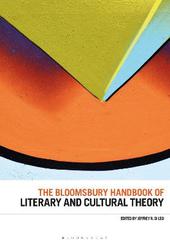
|
The Bloomsbury Handbook of Literary and Cultural Theory
Paperback / softback
Main Details
| Title |
The Bloomsbury Handbook of Literary and Cultural Theory
|
| Authors and Contributors |
Edited by Professor Jeffrey R. Di Leo
|
| Series | Bloomsbury Handbooks |
|---|
| Physical Properties |
| Format:Paperback / softback | | Pages:800 | | Dimensions(mm): Height 244,Width 169 |
|
| Category/Genre | Literary theory |
|---|
| ISBN/Barcode |
9781350183612
|
| Classifications | Dewey:801.95 |
|---|
| Audience | | Professional & Vocational | |
|---|
|
Publishing Details |
| Publisher |
Bloomsbury Publishing PLC
|
| Imprint |
Bloomsbury Academic
|
| Publication Date |
14 January 2021 |
| Publication Country |
United Kingdom
|
Description
The Bloomsbury Handbook of Literary and Cultural Theory is the most comprehensive available survey of the state of the art t/Theory in the 21st-century. With chapters written by the world's leading scholars in their field, the book explores the latest thinking in traditional schools such as feminist, Marxist, historicist, psychoanalytic and postcolonial criticism and new areas of research in ecocriticism, biopolitics, affect studies, posthumanism, materialism and many other fields. In addition, the book includes a substantial A to Z of key words and important thinkers in contemporary theory, making this an essential resource for scholars of literary and cultural theory at all levels.
Author Biography
Jeffrey R. Di Leo is Professor of English and Philosophy and Dean of the School of Arts and Sciences at the University of Houston-Victoria, USA. He is editor of the American Book Review, founding editor of the journal symploke, and executive director of the Society for Critical Exchange and its Winter Theory Institute.
ReviewsDi Leo (English and philosophy, Univ. of Houston, Victoria) divides this handbook into two parts of approximately the same length. The first part comprises 27 essays by diverse hands on general topics within the embrace of literary and cultural theory; the second part provides explications of 'terms and figures' (presented alphabetically). The topics and authors in part 1 range from Paul Allen Miller on early theory and Herman Rapaport on structuralism and semiotics to Sean Grattan on affect studies and Vincent Leitch on antitheory. Each essay concludes with detailed notes and works cited. Summing Up: Recommended. * CHOICE * This book is an essential reference work on current thought and opinion on this topic, and both faculty and students of cultural and literary theory will enjoy perusal and deep exploration of its contents. * American Reference Books Annual *
|